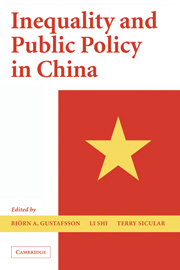Book contents
- Frontmatter
- Contents
- List of Tables and Figures
- Contributors
- Acknowledgments
- 1 Inequality and Public Policy in China: Issues and Trends
- 2 Income Inequality and Spatial Differences in China, 1988, 1995, and 2002
- 3 Growth and Distribution of Household Income in China between 1995 and 2002
- 4 Explaining Incomes and Inequality in China
- 5 The Distribution of Wealth in China
- 6 Growth, Inequality, and Poverty: A Comparative Study of China's Experience in the Periods before and after the Asian Crisis
- 7 What Has Economic Transition Meant for the Well-Being of the Elderly in China?
- 8 Inequity in Financing China's Health Care
- 9 China's Emerging Urban Wage Structure, 1995–2002
- 10 Unemployment, Earlier Retirement, and Changes in the Gender Income Gap in Urban China, 1995–2002
- 11 What Determines Living Arrangements of the Elderly in Urban China?
- 12 The Impact of Village-Specific Factors on Household Income in Rural China
- 13 The Redistributive Impact of Taxation in Rural China, 1995–2002: An Evaluation of Rural Taxation Reform at the Turn of the Century
- Appendix: The 1995 and 2002 Household Surveys: Sampling Methods and Data Description
- Index
- References
4 - Explaining Incomes and Inequality in China
Published online by Cambridge University Press: 25 July 2009
- Frontmatter
- Contents
- List of Tables and Figures
- Contributors
- Acknowledgments
- 1 Inequality and Public Policy in China: Issues and Trends
- 2 Income Inequality and Spatial Differences in China, 1988, 1995, and 2002
- 3 Growth and Distribution of Household Income in China between 1995 and 2002
- 4 Explaining Incomes and Inequality in China
- 5 The Distribution of Wealth in China
- 6 Growth, Inequality, and Poverty: A Comparative Study of China's Experience in the Periods before and after the Asian Crisis
- 7 What Has Economic Transition Meant for the Well-Being of the Elderly in China?
- 8 Inequity in Financing China's Health Care
- 9 China's Emerging Urban Wage Structure, 1995–2002
- 10 Unemployment, Earlier Retirement, and Changes in the Gender Income Gap in Urban China, 1995–2002
- 11 What Determines Living Arrangements of the Elderly in Urban China?
- 12 The Impact of Village-Specific Factors on Household Income in Rural China
- 13 The Redistributive Impact of Taxation in Rural China, 1995–2002: An Evaluation of Rural Taxation Reform at the Turn of the Century
- Appendix: The 1995 and 2002 Household Surveys: Sampling Methods and Data Description
- Index
- References
Summary
Introduction
After the mid-1980s income inequality in China increased markedly and has now reached a level that is relatively high by international standards. Underlying this increase was China's transition from a planned to a market economy. Prior to the transition a wide array of policies and programs had depressed income differentials. Wage differentials in urban areas were compressed and based largely on seniority and the ownership classification of the enterprise. In rural areas collective farms distributed earnings in an egalitarian fashion, and income inequality was mainly the result of differences among collective farms in resource endowments. Opportunities for households and individuals to engage in private income-generating activities were severely restricted.
With economic reforms the government has allowed, if not encouraged, some people to get rich first. In urban areas wage differentials and bonuses have increased; in rural areas farming is now household-based, and income differences reflect variation in household resources, abilities, and effort. Restrictions on private economic activities have been lifted, permitting diversification in sources of income and allowing returns to entrepreneurship. Such changes have naturally contributed to greater inequality.
The transition has led not only to a higher level of inequality, but also to a change in the underlying determinants of incomes and inequality. Markets now play a much enlarged role in the determination of incomes. As the scope of markets expands, one would expect incomes, and therefore inequality, to reflect differences in underlying productive characteristics and endowments such as land and labor endowments, education, and so on.
- Type
- Chapter
- Information
- Inequality and Public Policy in China , pp. 88 - 117Publisher: Cambridge University PressPrint publication year: 2008



